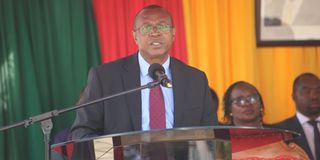Premium
KNEC sued over July 2025 KCSE exams

Knec CEO David Njengere speaks during the release of the 2024 KCSE results at Mitihani House in Nairobi on January 9, 2025.
What you need to know:
- The petition also highlights Kenya’s current economic struggles, arguing that the financial burden placed on repeat candidates and private candidates — many of whom are already struggling — exacerbates inequality in access to education.
- “Currently, Kenya’s economy is struggling and as a result, the same has caused a lot of financial strain and pushed taxation beyond the majority of Kenyans. However, instead of respondents doing the right thing, they have further punished the Kenyan learners with this unconstitutional administrative decision,” he said.
A Nakuru-based doctor wants the High Court to stop the Kenya National Examinations Council (KNEC) from administering July Form Four exams for repeaters and private candidates in July.
Dr Magare Gikenyi lodged the case at the High Court in Kisii, arguing that the move violates students’ rights and was made without proper public participation.
He is seeking an urgent court order to suspend the directive before the February 21, 2025 registration deadline.
Dr Gikenyi, a consultant surgeon and activist, argues that the directive violates constitutional rights, including the right to education, fair administrative action, and public participation.
He claims the decision was made arbitrarily without consulting key stakeholders, including parents and students.
The new policy, announced by Education Cabinet Secretary Julius Migos Ogamba on January 8, 2025, and formalised by Knec on January 22, 2025, requires repeaters and private candidates to register for the July series between January 27 and February 21, 2025.
Other candidates who are in school settings will sit their examinations in November, as usual.
The petitioner contends that the move by Knec unfairly disadvantages candidates by reducing their preparation time and creating two classes of candidates with different examination schedules.
He argues that candidates will be denied their “legitimate expectation” to prepare and sit the exams in November, as has been the tradition.
“The mandatory nature (as opposed to choosing either to sit for July or November examination series) goes against the right of every individual to choose an examination which is convenient to him or her to enjoy the rights and fundamental freedoms in the Bill of Rights to the greatest extent as provided in Article 20(2) of the constitution states: ‘Every person shall enjoy the rights and fundamental freedoms in the Bill of Rights to the greatest extent consistent with the nature of the right or fundamental freedom’”, the petition reads in part.
Dr Gikenyi has sued Knec CEO David Njeng’ere as the second respondent as well as the Ministry of Education, Mr Ogamba, and the attorney-general.
The petitioner has listed the Kenya Secondary School Heads Association (Kessha), Kenya Private Schools Association, and Kenya Parents Association as interested parties.
“If this honourable court does not stop the illegal actions and or omissions done by the respondents, then the outlined constitutional violations will continue against the rule of law and principles of good governance,” reads a part of the petition.
Dr Gikenyi notes that the shortened registration period, from January 27 to February 21, 2025, disadvantages repeaters and private candidates who must self-fund their exams without government support.
“Impugned administrative action guidelines with short preparation period will impede one’s effort to achieve his or her economic and labour market ostensibly by scoring less than expected. These actions and/or omissions contravene articles 10,41,43 and 73 of the constitution,” the petition reads in part.
“It’s an undeniable fact that the respondents will use the KCSE results to place students at various public and private universities. Once unfairly treated in secondary school, the learners’ future life is doomed. The constitution should never allow administrative decisions that affect the rights of students or children, who are the future of this country of ours. Students and parents have a lot of regard for the course to pursue. The effect of this will have devastating effects on the majority of Kenyan students affected by this barbaric administrative action,” it added.
Dr Gikenyi argues that conflicting statements from the Ministry of Education and Knec — where the Cabinet Secretary stated that adult candidates "may" opt for the July series, but KNEC guidelines mandate it — create confusion and uncertainty.
The petition also highlights Kenya’s current economic struggles, arguing that the financial burden placed on repeat candidates and private candidates — many of whom are already struggling — exacerbates inequality in access to education.
“Currently, Kenya’s economy is struggling and as a result, the same has caused a lot of financial strain and pushed taxation beyond the majority of Kenyans. However, instead of respondents doing the right thing, they have further punished the Kenyan learners with this unconstitutional administrative decision,” he said.





